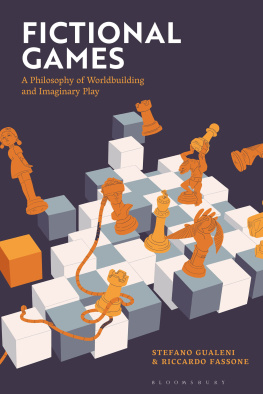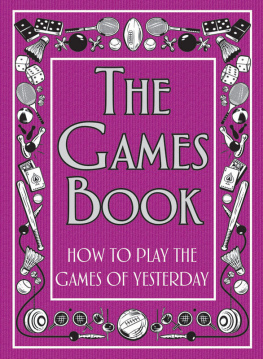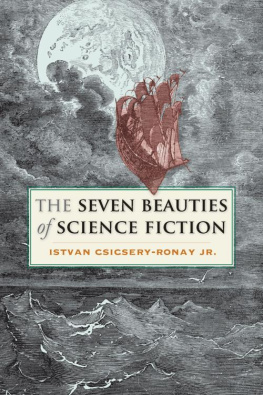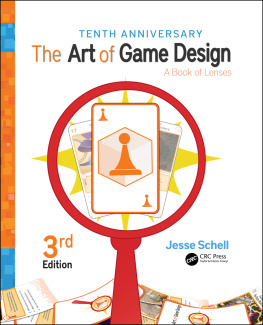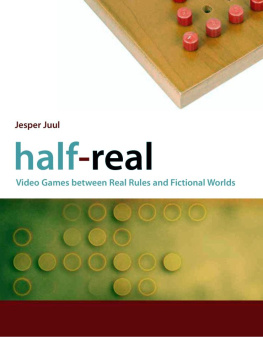
Fictional Games
Also available from Bloomsbury
Every Game is an Island: Endings and Extremities in Video Games, Riccardo Fassone
Material Game Studies: A Philosophy of Analogue Play, ed. Chlo Germaine and Paul Wake
Video Games, Violence, and the Ethics of Fantasy: Killing Time, Christopher Bartel
Intermedia Games Games Inter Media: Video Games and Intermediality, ed. Michael Fuchs and Jeff Thoss

Contents
A screenshot from the fictional video game Global Thermonuclear War as played in the 1983 film WarGames, directed by John Badham.
A screenshot of the 2012 video game Mass Effect 3 (BioWare) showing a game of Kepesh-Yakshi. Analogous to popular board games in the actual world, Kepesh-Yakshi requires its fictional players to optimize their resource management and strive for territorial domination.
A game of Muggle Quidditch, a playable version of the fictional sport Quidditch in the Harry Potter series of novels. The term muggle is used in the novels to designate someone who lacks magical abilities.
A playable version of Cyvasse, complete with a board and a set of official (as well as alternative) rules. The game was adapted and integrated by the Bristol Design Forge on the basis of how the game is described and played in the fantasy novel series A Song of Ice and Fire.
Calvin and Hobbes playing a game of Calvinball.
The rules of Whack-Bat as explained in Wes Andersons 2009 film Fantastic Mr. Fox. The protagonist of the film, Mr. Fox, is a skilled player of this humorous adaptation of the game of cricket.
A frame of the 1977 film Star Wars: Episode IV A New Hope, directed by George Lucas, showing an ongoing game of the holographic board game Dejarik.
The fictional game Domination is played by James Bond (Sean Connery) and Maximillian Largo (Klaus Maria Brandauer) in this frame of the 1983 film Never Say Never Again, directed by Irvin Kershner.
A game of Rollerball: a ruthless sport combining skating, motorcycling, and American football, played in the 1975 film with the same name, directed by Norman Jewison.
A screenshot of the 2014 video game Dragon Age: Inquisition (BioWare) in which some of the characters are playing a game of Wicked Grace.
A frame of Robert Altmans 1979 film Quintet. The characters of the film play a game of Quintet on its five-sided wooden board using custom-made tokens.
In the 2009 digital game Every Day the Same Dream, the player experiences various episodes within the monotonous life of a white-collar worker in a short, playable reflection on existence, alienation and the refusal of labour.
The final confrontation between Ben Richards (Arnold Schwarzenegger) and the show host Damon Killian (Richard Dawson) in the 1987 film The Running Man, directed by Paul Michael Glaser.
The entrancing game found in Star Trek: The Next Generations episode The Game. The characters addiction to the game is so profound that they eventually put their own survival (and that of their ship) at risk.
A frame taken from the episode Mortynight Run of the animated series Rick and Morty capturing Rick Sanchez playing Roy: A Life Well Lived. The social context of the pan-galactic arcade hall and its orientation towards entertainment and performativity is evident in this figure, with the spectator-friendly screen showing the game progress while the active player lies unconscious in their seat.
In this frame, Nicholas Van Orton (Michael Douglas) signs the contract that initiates the game that will lead him to the brink of insanity in David Finchers 1997 film The Game.
At a Chinese restaurant, Ted Pikul (Jude Law) the protagonist of the 1999 film eXistenZ is compelled by the game to shoot a waiter with a gun made on the spot using the bones of a mutant fish. Directed by David Cronenberg.
In the fictional video game My Dinner with Andre, the player appears to be guiding the conversation among the characters. This scene both reflects sarcastically on the tone of the film that inspired the fictional game and serves as a moment of indirect characterization for Martin Prince Jr. The Simpsons.
Daniel Vella

In Olga Tokarczuks 1996 novel, Primeval and Other Times, Squire Popielski, a wealthy landowner in the village of Primeval, which is the place at the centre of the universe (2010: 9), falls into a profound depression. It is 1932, and he is thirty-eight years old. He has lost his religious faith, grown disillusioned with the political promise of the newly independent Polish nation and been abandoned by his artist lover. In his despondency, he is visited by a rabbi, to whom he poses three questions: Where did I come from?, What can a person actually know? and What should a person achieve, how should he live, what should he do, and what not? (ibid.: 756). By way of an answer to these questions and a fourth that the rabbi adds to the list: Where are we heading? What is the goal of time? he receives an old wooden box. Inside are the components of a mysterious game a complex circular labyrinth printed on cloth; a set of brass pieces representing people, animals and objects; an eight-sided die and a book of instructions labelled Ignis fatuus, or an instructive game for one player.
The game takes over the Squires life. He loses interest in his family and business concerns and notices the German soldiers who come to occupy his village during the Second World War only as an unwelcome distraction. As the novel proceeds and we learn of the events that befall Primeval and its inhabitants over the course of the upheavals and tragedies of the twentieth century, the game and the Squires playing of it remain a vital element, interwoven with the novels many other strands and reflecting the personal and national histories to which we bear witness. In this way, Primeval and Other Times can be spoken of in relation to numerous other works of fiction novels, stories, films, TV shows and even digital games in which fictional games occupy a significant narrative or thematic role, so much so that, in many cases as in Hermann Hesses The Glass Bead Game, in Suzanne Collins The Hunger Games or in A. S. Byatts 1967 novel or David Finchers 1997 film, both simply called The Game these fictional games occupy a pivotal position reflected in the works title.
Given this preponderance of examples, it is somewhat surprising that, as Stefano Gualeni and Riccardo Fassone observe in this book, there has been very little sustained critical engagement with fictional games. It is precisely this lack that Fictional Games sets out to tackle, and it does so with aplomb. Gualeni and Fassones achievement, I would argue, is twofold. First a necessary, foundational contribution in a field so underexplored they offer a wide-ranging survey of fictional games across literature, cinema, TV and digital games. Although the book does not aim for encyclopaedic exhaustiveness, the Appendix, which lists the ninety-two fictional games covered in the book, might well represent the first available transmedial corpus of fictional games, providing the reader with a rich whistle-stop tour of fictional games in all their variety, and the scholar with an invaluable resource for any future studies on fictional games.
Next page
